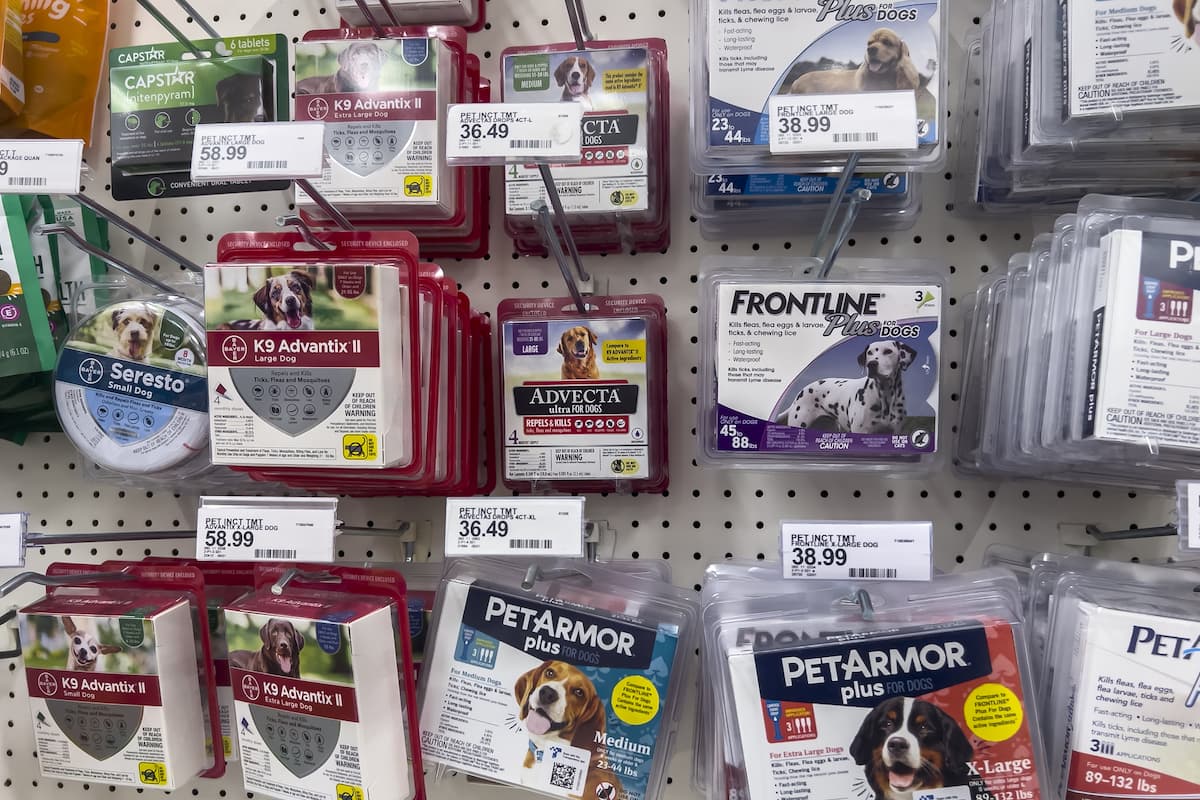Does Frontline Kill Bed Bugs?
If you are worried about bed bugs biting your pets, you may wonder if Frontline can prevent or even kill these pesky insects.
Frontline will often kill bed bugs, but only after they have already bitten your pets. Frontline is not potent enough to kill bed bugs on contact when applied to your pet’s skin. However, it can kill bed bugs if you put it directly on them.
How Can Frontline Kill Bed Bugs That Bite My Pet?

Frontline can kill bed bugs that bite your pet in the same way it kills fleas and ticks.
Basically, Frontline works by absorbing into your pet’s skin, where it travels around their body using the animal’s oil glands.
When insects come into contact with the medication, it affects their nervous system and eventually causes them to die.
Thus, when bed bugs go crawling around and feeding on your pet, they will absorb some of the Frontline medication, which will lead to death.
However, Frontline does not work immediately.
It usually takes between 18 and 24 hours after an insect touches or consumes the Frontline medication before it will die.
And since bed bugs feed quickly, they will bite your pet and leave their body before the treatment can kill them.
Yet, still, Frontline can help you get rid of some of the bed bugs in your home since it will kill the ones that bother your animals.
But, Frontline alone will not eliminate an entire bed bug infestation because it is doubtful that every bed bug in your house will bite your pet.
Can I Use Frontline as an Insecticide?
Technically, Frontline is an insecticide since it kills insects.
However, there is no point in using Frontline as a bug spray.
For one, Frontline rarely affects insects after it has dried.
It works continuously on a pet’s skin because the animal secretes the medicine from their oil glands, meaning the chemicals in the Frontline are always moist.
If you just place it on your mattress or another spot in your house, though, it will dry pretty quickly, rendering it useless.
Also, using Frontline as an insecticide will cost you a lot of money.
Frontline comes in much smaller amounts than what you’d get in a standard bed bug spray bottle, and these minute volumes of Frontline cost about four times as much.
Therefore, overall, trying to use Frontline as an insecticide is both expensive and impractical.
What Kinds of Animals Do Bed Bugs Bite?

To protect all of your pets properly, you need to know which ones bed bugs will bite.
And to answer that inquiry, bed bugs can feed on any warm-blooded animal.
Thus, bed bugs may go after pets, such as cats, dogs, rabbits, hamsters, and birds.
However, bed bugs can not drink the blood of cold-blooded animals, meaning that reptiles and amphibians are safe from bed bugs.
Also, you should be aware that animals that sleep in the bed with you are the most at risk of bed bug bites.
Basically, bed bugs prefer humans, so they like to stay around people’s mattresses so that they can easily and quickly come out and eat.
Yet, if one of your pets is sleeping with you, the bed bug may get confused and bite your pet instead of you.
Therefore, if you have bed bugs, you may want to stop your pets from sleeping on your mattress until you can get rid of the insects.
Can Bed Bugs Harm My Pets?
Luckily, bed bugs do not spread disease like many other blood-sucking insects, such as mosquitos and ticks.
However, that doesn’t mean that bed bugs can’t affect your pets.
Itching is the most common symptom experienced by both humans and animals who have to deal with bed bugs.
Essentially, bed bug bites irritate the skin, which can lead to a lot of annoyance.
And how much the bed bug bites will itch will depend on how your pet’s skin and immune system react.
Some animals will just get some skin irritation, and it isn’t a big deal, while others may become itchy to the point where it’s painful, causing them to scratch until they bleed.
This frequent scratching of bed bug bites can lead to open sores, which could develop into an infection.
Thus, if your pet is scratching a lot, you should check their skin daily to ensure they don’t have any signs of infection or large or deep sores.
If they do, you should take them to the vet.
Additionally, you should be aware that, in severe cases, bed bugs could cause anemia in both humans and animals.
Bed bugs can cause anemia if they drink so much blood out of an organism that it can no longer properly sustain its normal bodily functions.
Signs of anemia in pets include dizziness, fatigue, pale skin, and unusual heartbeat or breathing patterns.
If you think your pet may have anemia, you should take them to the vet as soon as possible and explain the situation to their doctor.
Anemia is a serious condition and can be fatal if not treated.
Yet luckily, it isn’t common for either humans or animals to get anemia from bed bugs unless they live in a home with a severe infestation.
How Do I Find Bed Bugs on My Pet?

It is essential you understand that bed bugs do not live on pets or people in the same way as fleas, lice, and ticks.
Bed bugs also feed quickly and leave right after.
Therefore, it would be rare to find bed bugs on your pet’s skin.
So, since bed bugs do not live on the skin, there is no point in going through your pet’s hair to find and pull them off like you would fleas and ticks.
Conclusion
Frontline can kill bed bugs that climb onto your pet.
However, Frontline will not kill insects on contact.
Instead, it will take about 18 to 24 hours before the bugs die, meaning that the bed bugs will still bite your pet even if they are wearing Frontline.
